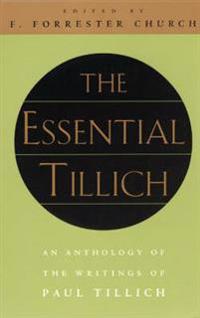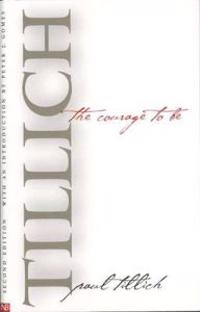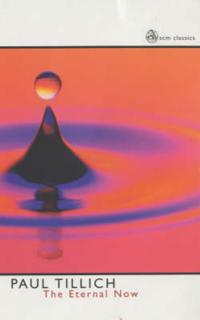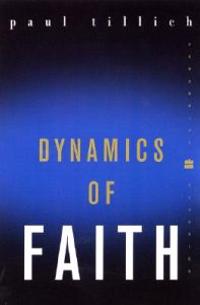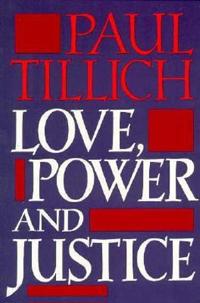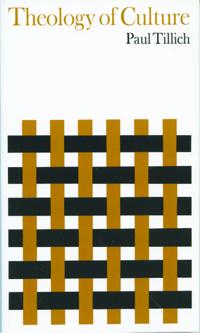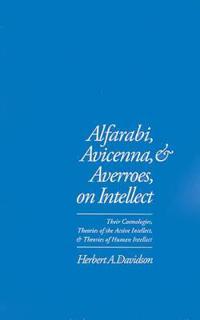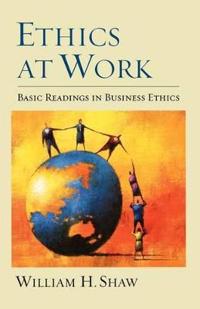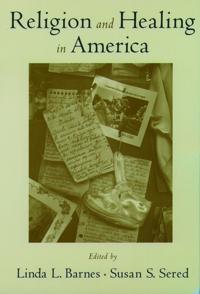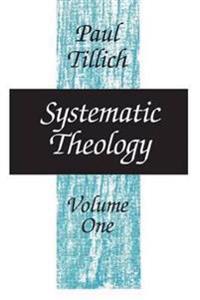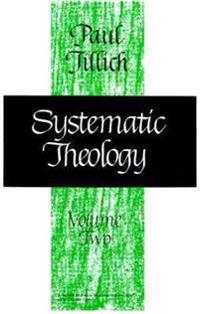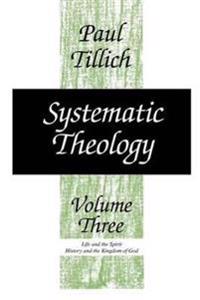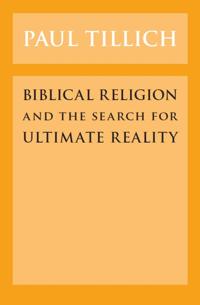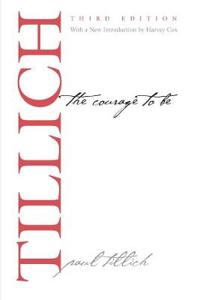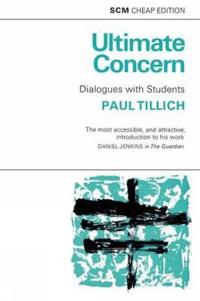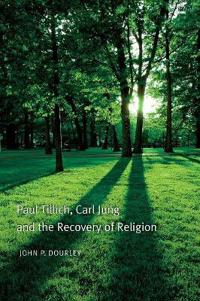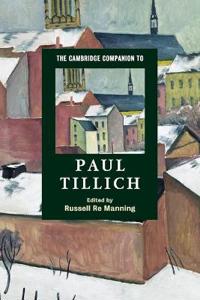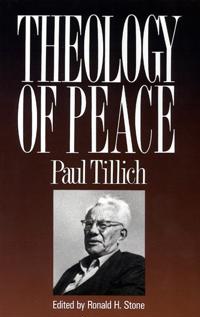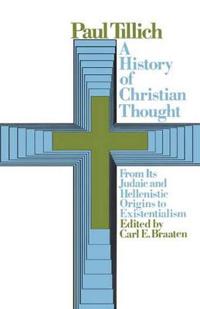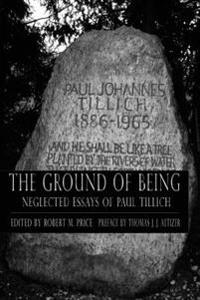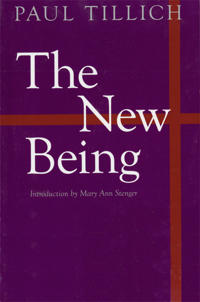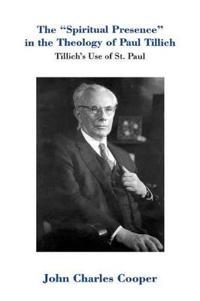The Essential Tillich (Häftad)
avPaul Tillich, Forrest Church, F. Forrester Church
ISBN: 9780226803432 - UTGIVEN: 199909"With this volume, Paul Tillich joins the ranks of the great Christian theologians such as Augustine of Hippo and Thomas Aquinas. . . .This volume, compiled by a noted minister and scholar, offers to the theological student, church worker, or, indeed, any serious reader struggling with the existenti[...]
The Courage to Be (Pocket)
avPaul Tillich, Peter J. Gomes, Paul Tillich
ISBN: 9780300084719 - UTGIVEN: 200008In this classic and deeply insightful book, one of the world's most eminent philosophers describes the dilemma of modern man and points a way to the conquest of the problem of anxiety. This edition includes a new introduction by Peter J. Gomes that reflects on the impact of this book in the years si[...]
The Eternal Now (Häftad)
avPaul Tillich, Paul Tillich, David H. Kelsey, Luther Wiegle
ISBN: 9780334028758 - UTGIVEN: 200205These 16 sermons contain in concentrated form some of Tillich's most lambent themes. Although they were first published in the early 1960s, the pieces in question take up preoccupations which continue to haunt us at the beginning of the 21st century. Tillich discusses, among other topics, wisdom; sa[...]
Dynamics of Faith (Häftad)
avPaul Tillich
ISBN: 9780060937133 - UTGIVEN: 200110One of the greatest books ever written on the subject, Dynamics of Faithis a primer in the philosophy of religion. Paul Tillich, a leading theologian of the twentieth century, explores the idea of faith in all its dimensions, while defining the concept in the process.This graceful and accessible vol[...]
Love, Power, and Justice: Ontological Analysis and Ethical Applications (Häftad)
avPaul Tillich
ISBN: 9780195002225 - UTGIVEN: 196012This book presents Paul Tillich at his very best--brief, clear, stimulating, provocative. Speaking with understanding and force, he makes a basic analysis of love, power, and justice, all concepts fundamental in the mutual relations of people, of social groups, and of humankind to God. His concern[...]
Theology of Culture (Häftad)
avPaul Tillich
ISBN: 9780195007114 - UTGIVEN: 196410"Theology of Culture" draws together fifteen of Dr. Tillich's finest essays, in which a diversity of contemporary attitudes and problems is brought within the wide scope of his philosophy. His classic essay, "The Two Types of Philosophy of Religion, " is included here as a focal arguement for closin[...]
Alfarabi, Avicenna and Averroes on Intellect (Inbunden)
avPaul Tillich
ISBN: 9780195074239 - UTGIVEN: 199206The distinction between the potential intellect and the active intellect was first drawn by Aristotle. Medieval Islamic, Jewish, Christian philosophers, and European philosophers in the sixteenth century considered it a possible key to deciphering the nature of man and the universe. In this book, He[...]
Ethics at Work (Häftad)
avPaul Tillich
ISBN: 9780195139426 - UTGIVEN: 200211A unique and compact collection, Ethics at Work: Basic Readings in Business Ethics is an ideal text for courses in business ethics, business and society, or applied ethics. Bringing together eleven essays by prominent authors, it features some of the best work in the field and addresses important an[...]
Religion and Healing in America (Häftad)
avPaul Tillich
ISBN: 9780195167962 - UTGIVEN: 200501Throughout much of the modern era, faith healing received attention only when it came into conflict with biomedical practice. During the 1990s, however, American culture changed dramatically and religious healing became a commonplace feature of our society. Increasing numbers of mainstream churches [...]
Systematic Theology (Häftad)
avPaul Tillich
ISBN: 9780226803371 - UTGIVEN: 197309This is the first part of Paul Tillich's three-volume "Systematic Theology, " one of the most profound statements of the Christian message ever composed and the summation and definitive presentation of the theology of the most influential and creative American theologian of the twentieth century.[...]
Systematic Theology (Häftad)
avPaul Tillich
ISBN: 9780226803388 - UTGIVEN: 197502This is the first part of Paul Tillich's three-volume "Systematic Theology, " one of the most profound statements of the Christian message ever composed and the summation and definitive presentation of the theology of the most influential and creative American theologian of the twentieth century.[...]
Systematic Theology (Häftad)
avPaul Tillich
ISBN: 9780226803395 - UTGIVEN: 197609In this volume, the third and last of his "Systematic Theology," Paul Tillich sets forth his ideas of the meaning of human life, the doctrine of the Spirit and the church, the trinitarian symbols, the relation of history to the Kingdom of God, and the eschatological symbols. He handles this subject [...]
Biblical Religion and the Search for Ultimate Reality (Häftad)
avPaul Tillich
ISBN: 9780226803418 - UTGIVEN: 196403Dr. Tillich shows here that in spite of the contrast between philosophical and biblical language, it is neither necessary nor possible to seperate them from each other. On the contrary, all the symbols used in biblical religion drive inescapably toward the philosophical quest for being. An important[...]
The Courage to be (Häftad)
avPaul Tillich
ISBN: 9780300188790 - UTGIVEN: 2014-07Originally published more than fifty years ago, The Courage to Be has become a classic of twentieth-century religious and philosophical thought. The great Christian existentialist thinker Paul Tillich describes the dilemma of modern man and points a way to the conquest of the problem of anxiety. Thi[...]
Paul Tillich, Carl Jung, and the Recovery of Religion (Pocket)
avJohn P. Dourley
ISBN: 9780415460248 - UTGIVEN: 2008-07Is religion a positive reality in your life? If not, have you lost anything by forfeiting this dimension of your humanity? This book compares the theology of Tillich with the psychology of Jung, arguing that they were both concerned with the recovery of a valid religious sense for contemporary cultu[...]
The Cambridge Companion to Paul Tillich (häftad)
ISBN: 9780521677356 - UTGIVEN: 2009-02The complex philosophical theology of Paul Tillich (1886-1965), increasingly studied today, was influenced by thinkers as diverse as the Romantics and Existentialists, Hegel and Heidegger. A Lutheran pastor who served as a military chaplain in World War I, he was dismissed from his university post a[...]
The Cambridge Companion to Paul Tillich (Inbunden)
avRussell Re (EDT) Manning
ISBN: 9780521859899 - UTGIVEN: 2009-02The complex philosophical theology of Paul Tillich (1886-1965), increasingly studied today, was influenced by thinkers as diverse as the Romantics and Existentialists, Hegel and Heidegger. A Lutheran pastor who served as a military chaplain in World War I, he was dismissed from his university post a[...]
Theology of Peace (Häftad)
avPaul Tillich
ISBN: 9780664251185 - UTGIVEN: 199011This gift from one of the greatest twentieth-century Protestant theologians, Paul Tillich, is a collection of hopeful, realistic writings on peace from the years Tillich spent in America. Beginning in 1937, the book documents Tillich's pre-World War II hope of resistance to Hitler and moves to the t[...]
A History of Christian Thought (Pocket)
avPaul Tillich
ISBN: 9780671214265 - UTGIVEN: 1972-11Professor Tillich analyzes the development of Christian theology
The New Being (Häftad)
avPaul Tillich
ISBN: 9780803294585 - UTGIVEN: 200507These twenty-three meditations on key passages from the Bible were originally delivered as addresses at colleges and universities. They are short, powerful, and persuasive examinations of the effect of God's love on the life of the believer and the challenges of living the New Creation-"the infinite[...]

